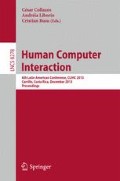Abstract
This paper reports upon the design and use of a lightweight evaluation method, especially designed to examine complex interactive systems. The approach is illustrated through a case study involving an interactive tool designed to help enable users examine large scale data arising from authentication activity in higher education institutes. The evaluation approach illustrated is to enable the lightweight assessment of usability issues within complex interactive systems and identifying opportunities for significant design improvements. Specifically we argue that this method benefits from capturing key generic factors that underpin the effectiveness of tools for working with complex data. The paper concludes by reflecting upon the effectiveness of the lightweight structured assessment approach and how it supports to formative evaluation.
Access this chapter
Tax calculation will be finalised at checkout
Purchases are for personal use only
Preview
Unable to display preview. Download preview PDF.
References
Blackwell, A.F., Green, T.R.G.: A Cognitive Dimensions questionnaire optimised for users. In: Blackwell, A.F., Bilotta, E. (eds.) Proceedings of the Twelfth Annual Meeting of the Psychology of Programming Interest Group, pp. 137–152 (2000)
Blandford, A., Green, T.R.G., Connell, I.: Formalising an understanding of user-system misfits. In: Bastide, R., Palanque, P., Roth, J. (eds.) DSV-IS 2004 and EHCI 2004. LNCS, vol. 3425, pp. 253–270. Springer, Heidelberg (2005)
Dearden, A.M., Finlay, J.: Pattern languages in HCI: A critical review. Human Computer Interaction 21(1), 49–102 (2006), doi:10.1207/s15327051hci2101_3
Green, T.R.G., Blackwell, A.F.: Design for usability using Cognitive Dimensions. Tutorial Session at British Computer Society Conference on Human Computer Interaction (HCI 1998) (1998), http://www.cl.cam.ac.uk/~afb21/CognitiveDimensions/CDtutorial.pdf
Green, T.R.G., Blandford, A.E., Church, L., Roast, C.R., Clarke, S.: Cognitive dimensions: Achievements, new directions, and open questions. Journal of Visual Languages and Computing 17(4), 328–365 (2006), doi:10.1016/j.jvlc.2006.04.004
Grudin, J.: The case against user interface consistency. CACM 32(10), 1164–1173 (1989), doi:10.1145/67933.67934
Nielsen, J., Molich, R.: Heuristic evaluation of user interfaces. In: Chew, J.C., Whiteside, J. (eds.) Proceedings of the SIGCHI Conference on Human Factors in Computing Systems (CHI 1990), pp. 249–256. ACM, New York (1990), doi:10.1145/97243.97281
Nielsen, J.: Usability Engineering. Academic Press, Boston (1993)
Roast, C., Khazaei, B.: An investigation into the validation of formalised cognitive dimensions. In: Doherty, G., Blandford, A. (eds.) DSVIS 2006. LNCS, vol. 4323, pp. 109–122. Springer, Heidelberg (2006)
Roast, C., Dearden, A., Uruchurtu, E.: Using and utilizing an innovative media development tool. In: Proceedings of the 10th Brazilian Symposium on Human Factors in Computing Systems and the 5th Latin American Confernce on Human-Computer Interaction, pp. 145–156 (2011)
Roast, C., Uruchurtu, E., Dearden, A.: The programming-like-analysis of an innovative media tool. In: Psychology of Programming Interest Group Annual Conference. University of York (2011)
Scapin, L.D., Bastien, C.J.M.: Ergonomic criteria for evaluating the ergonomic quality of interactive systems. Behaviour and Information Technology 16, 220–231 (1997)
Author information
Authors and Affiliations
Editor information
Editors and Affiliations
Rights and permissions
Copyright information
© 2013 Springer International Publishing Switzerland
About this paper
Cite this paper
Roast, C., Uruchurtu, E. (2013). Formative Evaluation for Complex Interactive Systems. In: Collazos, C., Liborio, A., Rusu, C. (eds) Human Computer Interaction. CLIHC 2013. Lecture Notes in Computer Science, vol 8278. Springer, Cham. https://doi.org/10.1007/978-3-319-03068-5_10
Download citation
DOI: https://doi.org/10.1007/978-3-319-03068-5_10
Publisher Name: Springer, Cham
Print ISBN: 978-3-319-03067-8
Online ISBN: 978-3-319-03068-5
eBook Packages: Computer ScienceComputer Science (R0)

